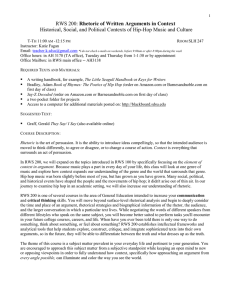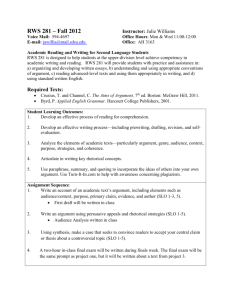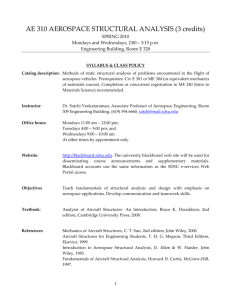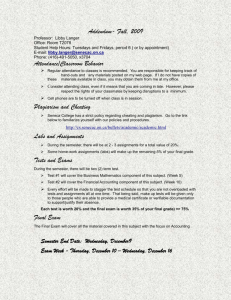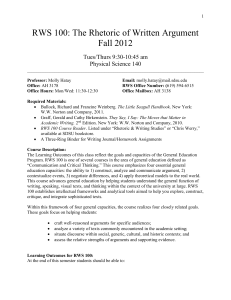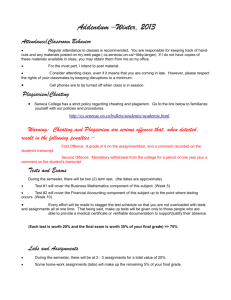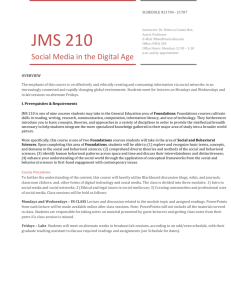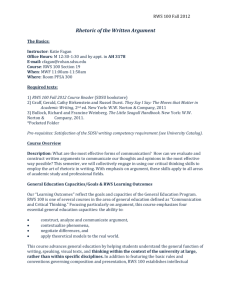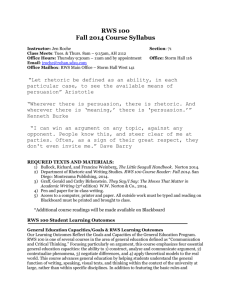View/Open
advertisement
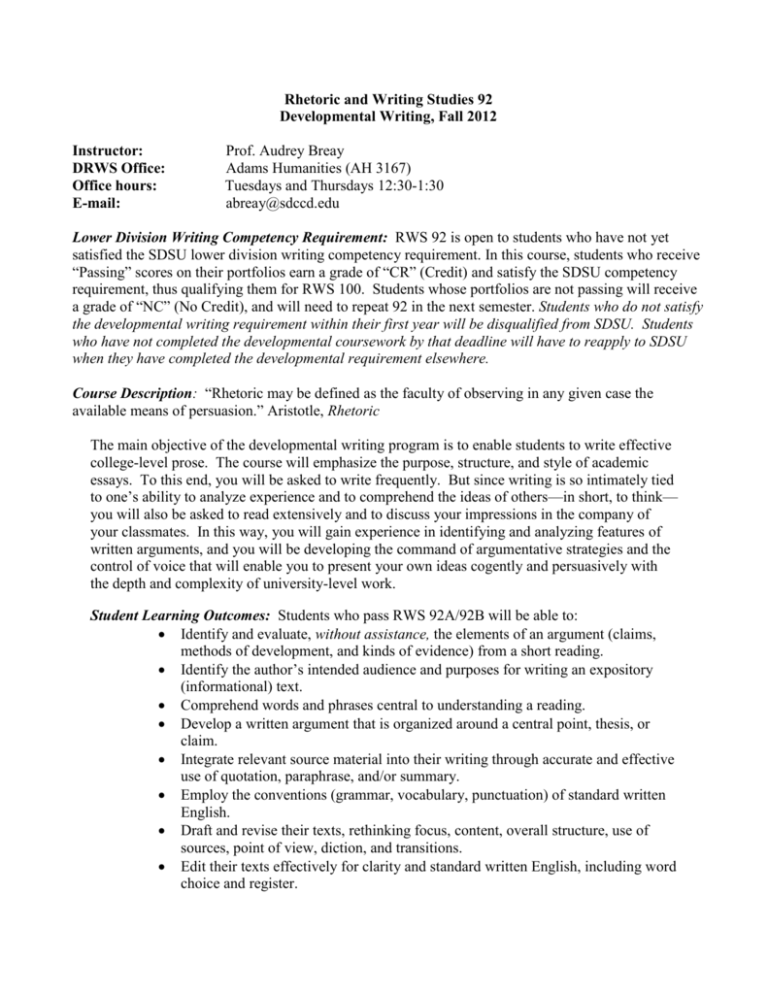
Rhetoric and Writing Studies 92 Developmental Writing, Fall 2012 Instructor: DRWS Office: Office hours: E-mail: Prof. Audrey Breay Adams Humanities (AH 3167) Tuesdays and Thursdays 12:30-1:30 abreay@sdccd.edu Lower Division Writing Competency Requirement: RWS 92 is open to students who have not yet satisfied the SDSU lower division writing competency requirement. In this course, students who receive “Passing” scores on their portfolios earn a grade of “CR” (Credit) and satisfy the SDSU competency requirement, thus qualifying them for RWS 100. Students whose portfolios are not passing will receive a grade of “NC” (No Credit), and will need to repeat 92 in the next semester. Students who do not satisfy the developmental writing requirement within their first year will be disqualified from SDSU. Students who have not completed the developmental coursework by that deadline will have to reapply to SDSU when they have completed the developmental requirement elsewhere. Course Description: “Rhetoric may be defined as the faculty of observing in any given case the available means of persuasion.” Aristotle, Rhetoric The main objective of the developmental writing program is to enable students to write effective college-level prose. The course will emphasize the purpose, structure, and style of academic essays. To this end, you will be asked to write frequently. But since writing is so intimately tied to one’s ability to analyze experience and to comprehend the ideas of others—in short, to think— you will also be asked to read extensively and to discuss your impressions in the company of your classmates. In this way, you will gain experience in identifying and analyzing features of written arguments, and you will be developing the command of argumentative strategies and the control of voice that will enable you to present your own ideas cogently and persuasively with the depth and complexity of university-level work. Student Learning Outcomes: Students who pass RWS 92A/92B will be able to: Identify and evaluate, without assistance, the elements of an argument (claims, methods of development, and kinds of evidence) from a short reading. Identify the author’s intended audience and purposes for writing an expository (informational) text. Comprehend words and phrases central to understanding a reading. Develop a written argument that is organized around a central point, thesis, or claim. Integrate relevant source material into their writing through accurate and effective use of quotation, paraphrase, and/or summary. Employ the conventions (grammar, vocabulary, punctuation) of standard written English. Draft and revise their texts, rethinking focus, content, overall structure, use of sources, point of view, diction, and transitions. Edit their texts effectively for clarity and standard written English, including word choice and register. Reflect critically upon their progress as readers and writers. Required textbooks: (E)Dentity, Editor Stephanie Vie Argument as Dialogue: A Concise Guide, Goshgarian and Krueger Keys for Writers, Ann Raimes Required also: Registration through City College (during the first week of class) Access to a computer and a backup device, like a flash drive, to save all papers A minimum of three individual conferences with the assigned tutor for our course or with me. It is your responsibility to space these meetings throughout the semester as the tutor will not be able to accommodate multiple sessions with all students in the final week of class! Assignments: To complete this class, you must read the required texts carefully to evaluate an author’s argument and the methods by which the claim is developed by the author. Then, using the readings, you must plan, draft, and revise your papers. The writing assignments below, with their drafts, will become part of your portfolio which will be submitted during class time on Thursday, December 6th. NO LATE PORTFOLIOS WILL BE ACCEPTED. NO EXCEPTIONS. Here is the assignment list: Assignment #1: Introduce a topic and compare two relevant positions, drawing from two sources. Assignment #2: Identify and evaluate arguments from two or more texts on the same topic. Assignment #3: Construct an argument from multiple sources, Assignment #4: Reflect critically on student’s progress as a writer. (In class, timed assignment not subject to revision) Assignment #5: Respond to a text-based argument under timed conditions. Our Final Exam for this course is scheduled for SATURDAY, December 8th from 8:00-10:00 am. When are these assignments due? What is your daily homework? Come to class and attend your conferences with your instructor and tutor. In addition, refer regularly to the course calendar that will be distributed during the second week of class, and check Blackboard for important updates. Grading: Students must complete all five assignments satisfactorily on the dates assigned. When the assignments are completed, they will be evaluated by your instructor or tutor, using the rubric for the final examination. Assignments #2 and #3, and their drafts, and Assignment #4 will be included in the final portfolio. This folder will be turned in on Thursday, December 6th by all students who are permitted to sit for Assignment #5. After Assignment #5 is completed, graders will read the portfolios. Students whose portfolios are passed by two RWS instructors will have earned credit for the class and will move on to RWS 100. Students whose portfolios do not pass will take 92 again in the spring semester. Please note that RWS 92 instructors do not participate in the evaluation of their own students’ final portfolios. *Remember that you must register for City College during the first week of the semester, as well. Other important issues: Requirements for Written Work: All out of class writing assignments will be typed and will follow MLA guidelines for format. Writing assignments must be submitted in hard copy—NOT via email—on the day that they are due. This includes required drafts and revisions of writing assignments. To be eligible to submit a final portfolio, students must adhere to these requirements. Absences and Tardiness: Since you must pass this course in order to remain enrolled at SDSU, it is expected that you will attend every class session and conference—and you will arrive on time. You are expected to remain in class throughout the class session unless you have asked your instructor, in advance, to leave. You cannot submit a final portfolio if you have more than three unexcused absences from class or conferences. Behavior: It is important to the entire class for you to turn off your cell phones before the class begins, (that means NO TEXTING) work well in groups, and treat your instructors and fellow students with respect. Late Work: No late work will be accepted unless you have a doctor’s excuse. Plan ahead. Plagiarism (adapted from the SDSU Catalogue): Plagiarism is presenting someone else’s words, phrases, ideas, or concepts as if they were your own. In your writing you must always give credit through complete citations if you use someone else’s words or ideas through quotation, summary, paraphrase, or synthesis. Plagiarism will not be tolerated in this course. If you use material from a printed source or the web without proper citation, or if you copy another student’s work, you will fail the assignment you turned in—at the very least. The incident will also be reported and go on record with the University. You could face academic probation, suspension, or even expulsion, from SDSU. See the SDSU General Catalogue for the full plagiarism policy. Special Needs: Students with disabilities who may need accommodations in this class are to notify the instructor and tutor early in the semester so that reasonable accommodations may be made. Official verification of the necessary accommodations needs to be made through Disabled Student Services.
